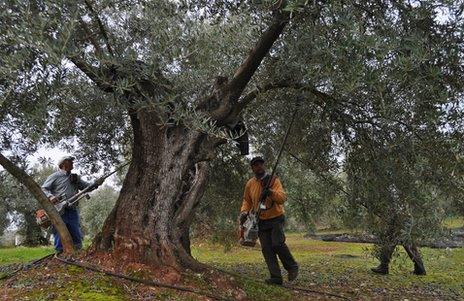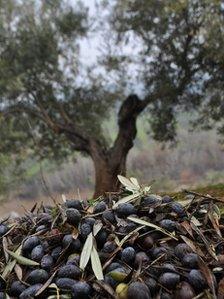Spain's bumper olive years come to bitter end
- Published

Men use strimmer-like machines to shake the olives off their branches
Spain is by far the biggest producer of olive oil in the world, accounting last year for around 50% of the total production worldwide.
However farmers in southern Spain believe their crop of olives this year is down by as much as 80%, and some think it is inevitable that the price of this increasingly sought-after commodity will rise.
Wherever you drive in Jaen, part of Spain's southern region of Andalucia, there are olive fields, stretching as far as the eye can see.
The province accounts of around half of Spain's total production.
As the olive harvest draws to a close, farmers in Jaen say their crop could be only 20% of what it was last year.
"The rain was noticeable for its absence," says Diego Galindo, vice-president of the San Julian Olive Oil Cooperative in Jaen.
He describes the harvest this year as "really bad".
'Dangerous level'
Industry experts such as Juan Vilar, who has written 14 books about olive oil and teaches a course in olive oil at Jaen University, believe the fall in production could be felt around the world.

Spain is the world's biggest olive oil producer
"This year, Spain will have only enough production to cover its internal consumption," he says.
Mr Vilar argues that, because Spain normally produces between 40 and 60% of the world's olive oil, there might not be enough this year to meet demand worldwide.
"If this year we don't have enough oil to cover the total consumption worldwide, then the price will increase to a dangerous level," he says.
By "dangerous" he means that there is the risk that consumers might be tempted to opt for cheaper alternatives.
However an expert at Deoleo, one of the biggest olive oil companies in the world, believes the fall in production in Spain this year will not be so marked.
The company's managing director in Spain and Italy, Jose Maria Collantes, estimates that the Spanish olive harvest will be around 50% of what it was last year - and last year was a bumper crop.
"We have had record crops for the three previous years," he says.
He argues that the surplus from recent years will reduce the impact of this year's poor harvest.
"Like in any other market, if you have a shortage of supply the price goes up. However a price increase came in, in late August of 2012, and we don't expect any other price increase for the remainder of this crop."
'Andalucian gold'
.jpg)
Maria Rodriguez has been harvesting olives since the age of 12
The demand for olive oil worldwide is growing, especially in fast-growing economies such as Brazil, India and China.
Apart from the taste, part of the attraction is the supposed health benefits, which have been the subject of several studies carried out at Spanish universities.
Mr Vilar believes there is a direct correlation between high life expectancy in countries like Spain, Greece and Italy, and the large quantity of olive oil that people consume there.
He believes there is strong evidence that people who have a healthy amount of olive oil in their diet are less likely to have heart attacks, or to suffer from some forms of cancer.
However, to get the best health benefits, olive oil connoisseurs will tell you that the oil has to be "extra virgin", which comes from the best quality olives, and accounts for roughly 20% of the oil produced in Spain each year.
And in the olive fields of Jaen, 70-year-old Maria Rodriguez, who has been working the olive harvest since she was 12, agrees.
"It cures illnesses and helps your skin, and gives you a great complexion," she says. "For us here in Andalucia, it is our gold."